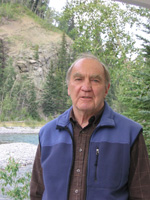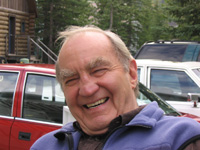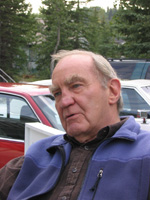North of 60 Interview: Ken Pogue
If you've watched much Canadian TV or cinema at all, you must have
seen Ken Pogue. His list of roles runs to pages. Viewers of the mid-
'80s spy series "Adderly" (which aired in both the U.S. and Canada)
will remember him as Adderly's boss, Major Clack. Fans of "Due South"
know him as the man who ordered the murder of Ben Fraser's father.
He's been seen in a futuristic Arnold Schwarzenegger film and a couple
of Tom Selleck westerns. In "Distant Drumming," he plays a tour guide
operator whose visit to Lynx River reopens some disturbing memories
from the past.
"North of 60" publicist Fran Humphreys and I chatted with Ken Pogue
as we sat on a porch overlooking the Lynx (Elbow) River.
Acting background
FH: How long have you been in the biz?
KP: I got my Equity card 42 years ago now. Which is a long time ago! I didn't really get into the media until I'd say the middle to late '70s.

(Click on photo for larger image.)
|
PW: By not getting into "the media," you mean you were doing theater before that?
KP: Uh-huh. I was trained for the theater in Toronto, but we had no real theater schools or anything like that. I was just a little too old to get into the first year of the National Theater School. So consequently I took a lot of individual training with teachers and coaches in Toronto, and did the amateur circuit. And then into the Crest Theater, and then I did something called the Canadian Players, which was a touring company. We toured Shakespeare all up and down the East Coast of the United States.
And eventually I went into Stratford. Over a period of time I did ten seasons at Stratford. Did a couple of years at the Guthrie Theater in Minneapolis because a director I'd worked with at Stratford had taken over the Guthrie. That was my longest excursion into the United States.
PW: Have you done any theater recently?
KP: No, I haven't done any theater for 12 years.
PW: Would you like to?
KP: I'm not sure. I had been away from the theater for six years when I did the last play I did, and I found that the rehearsal period is shorter. I think if I was going to do any work in the theater, I'd want to be assured that the time is going to be there to get the quality you want, that you felt really sure when you walked on the stage that everything was together.
"Distant Drumming"
FH: Did you know much about "North of 60" before you came here for the movie? Had you ever been part of the series?
KP: No, I'd never been part of the series. I guess it would be kind of unusual to have this kind of character come into the series.
FH: Yeah.
[The next portion of the interview contains spoilers for Ken Pogue's character in "Distant Drumming."
If you have seen the movie already, click here to read that section.]
FH: It is a complex character, though.
KP: Yes, it is.
FH: There's so much you know that no one else knows.
KP: Yeah, you have to kind of bring some kind of fullness to it, or else he becomes a kind of cipher, and that's not the intention of the script.
FH: How have you felt about your experience here so far?
KP: Oh, I love it! The crew's great, I love the set, I'm just having a good time.
PW: Had you seen the show before?
KP: Oh, of course. Not a regular watcher; only occasionally. And I'd known, for instance, Lubomir for many, many years. We go back in the theater a long way.
FH: This is Dean Bennett's first movie as a director. How's do you like working with him?
KP: Well, I worked with Dean on "Tom Stone."
PW: Did you have a recurring role on "Tom Stone"?
KP: I did two episodes before they killed me off!

(Click on photo for larger image.)
|
PW: Did you deserve to be killed off? [laughs]
KP: No! But it was a fun part. I was an ex-RCMP undercover man who was getting on. He was just beginning, I think, to suffer from Alzheimer's. He talked to himself a great deal about things like Kennedy's assassination and other conspiracy theories. I had a lot of fun with that character, and I was really, really sorry that they wrote him out.
FH: So how's Dean doing on this movie, from your actor's perspective?
KP: Oh, he's doing very well. I enjoy working with him. Very nice. And he knows what he's doing. I think he's getting his days in good time, and the actors are enjoying it.
FH: When you first heard about the role and got a chance to look at the script, did you have any other thoughts about being involved in it?
KP: I thought it would be great to do. You don't get often a chance to work with the first natives; you don't get that kind of opportunity much.
PW: When the show was originally on, did you ever think, "That would be a fun series to work on"?
KP: Well, as an actor I never think that way. It's something I learned a long time ago, that if it's something you wanted to do, you never got it.
PW: So you didn't want to jinx anything!
KP: That's right. I remember in the theater asking, "Do you think I could talk to you about that part?" "Oh yeah, you can come and talk to me." And you'd go and you'd make your pitch, and they never worked out. So you just roll with it the way it goes. So I was really delighted to be asked to come and play this.
PW: Is "North of 60" different from other shows you've worked on?
KP: The pace of this show is so different. And that's also refreshing about it, because so much TV has been, for such a long time, so highly cut, so driven, so pushed, so immediate. It's that zing-zing-zing to the next commercial thing that the television formula has worked itself into. Television by its nature always tries to intensify everything, I think in order to keep people's attention. Because one of the biggest problems in the TV business is how easy it is to flip the channel.
PW: That's one of the things I like best about "North of 60"--that it's more character driven, not so much action.
FH: I like that about "North of 60," too, but I know some people who don't like it. That's their complaint--the pace is [slow].
KP: And why should it look like everything else? That's one of the arguments we've been making for years: Why does Canadian television have to look like American television? And at one point in history, we didn't. We really didn't. And this, to me, is something that's happened because it's become a more and more commercially driven medium. The selling of things to the various markets has been part of what it's all become about.
Cowboys and aliens
FH: You say you're delighted to be here, and I know they were pretty keen to have you back after "Tom Stone," I know that.
KP: That's great. I like coming to Calgary. I've done some good shoots here. "The Jack Bull" I did here. And I've shot a couple of Tom Selleck movies out here, too.
PW: Fran, did you ever see "The Jack Bull"?
FH: No, but I love John Cusack.
PW: Jimmy Herman had a small scene in it, too. It's based on a 19th century German morality tale. Basically John Cusack's character loans some horses to someone who abuses them. He tries to get retribution, and things get out of hand, and he takes responsibility for his contribution to the problem. It's a very complex drama.
KP: It's a very complex script, and a very unhappy end for the hero of the piece. I had a scene that I really enjoyed in that in which I did not speak.
PW: What did you enjoy about that scene?
KP: The challenge of having to respond to being deeply chastised as a crooked judge, without dialog.
PW: But you had other scenes, too.
KP: Oh yes, yes.
PW: I see that you were a regular in "Adderly." I never watched that, but I've heard of it. What was your character?
KP: He was the head of a kind of secret service. It was a very tongue in cheek, funny kind of adventure.
PW: Who starred in that?
KP: Winston Rekert.
PW: So it was filmed in Canada?
KP: Yes, but it was shown late night on CBS for quite a while.
PW: Okay, I kind of thought we had it in the States.
KP: Also, more recently, I was in one episode of "Taken."
PW: What was your character involved in?
KP: I played an old man whose daughter had wandered out one night and fallen in love with the stars. Basically, she's taken. And she has twins who are not of this world.
PW: Oh, right, I remember that storyline. It supposedly took place in Washington? Or Alaska?
KP: Alaska.
PW: That's right, in the small town where the archaeologists from the university were doing research. And there were these twins who were shunned by the community because they could do weird things.
KP: Not only could they do weird things, they were not what you would call normal looking.
FH: Is this supposed to be based on a true story?
PW: That depends on your definition of "true"! [laughs] It starts at the end of World War II, then goes to the Roswell crash in 1947. It follows, I think, three generations of two families.
KP: Yeah, it's following the families that I think is really fascinating.
PW: Yeah, they followed the family of one of the abductees, but they also followed the family of one of the Air Force researchers, and how those families interacted over several decades.
KP: I like the interrelations of the families and how it continued over the years.
"Due South"
PW: Before we wrap up, I have got to ask you about "Due South." As I was telling Fran, you're quite notorious in "Due South" fandom.
KP: Yes, by turning Gordon Pinsent into a ghost! [all laugh]
PW: Yes, you were responsible for the death of the legendary Robert Fraser. You evil man! Your character ordered the murder of Ben Fraser's father. Fran, what happened was that there was a hydro project that had gone wrong and was flooding habitat and killing animals. Robert Fraser found out what was happening and was going to blow the whistle. But before he could, this nice-looking, this gentle-looking man over here had him viciously murdered. [all laugh]
KP: I was a really good RCMP officer!
PW: Until you went bad! Let's see...you were in the pilot episode, and then one other?
KP: Only once more, where I escaped from prison.

(Click on photo for larger image.)
|
PW: How did the role of Lt. Gerrard come about, and how did you like doing it? Especially since you were in the pilot. "Due South" was the first Canadian drama to get a regular primetime slot on U.S. TV. There must have been a lot of pressure on everyone to do a good job and bring in the ratings.
KP: The writer, Paul Haggis, and the original director really worked incredibly well. They had really worked the pilot script incredibly well. And the other really luxurious thing was that they were not afraid to spend money on the pilot. I was surprised. That's nothing we generally see in Canadian television--the detail that they were able to accomplish and the amount of footage they shot. I think that because of that type of caretaking they got a very good product out of the pilot.
PW: Your scenes were filmed somewhere in the north in the wintertime, right?
KP: We were up in Whitehorse [Yukon Territory]. Actually, we were billeted in Skagway, Alaska, and filmed in Whitehorse. We went up there for the snow. I think it was April by the time we filmed, and that's where they had to go to get the cold look they wanted for it. And the desolation.
PW: Your other episode was filmed in Toronto, right?
KP: That was in Toronto, yeah.
PW: I don't know whether you've ever given this any thought, but in the plot, it looks like Robert Fraser is about to tell everyone about the problems he has discovered with the dam, which is why your character, Gerrard, has him murdered. But you've been making deposits into his bank account. And the question has always been, did he really accept those deposits? Did the legendary Robert Fraser really go bad?
KP: Or did he even know they were there? I think as far as I was concerned, he never knew they were there.
PW: He never bothered checking his bank account?
KP: Uh-huh. And it was a way that I could implicate him and keep him alive, but that wasn't going to work out anyway. In other words, if I could make him crooked, or have enough planted on him, he would know that if he opened his mouth against me, he'd be in for it just as much as I would.
PW: You talk about Gerrard keeping Bob Fraser alive. Do you think Gerrard respected him?
KP: Well, yes. I don't know that getting him bumped off was necessarily my first choice. If I have to give this character a bit of a conscience! [laughs]
PW: That never occurred to me that Bob Fraser might not have even known about the deposits. I think everyone just assumed that he knew, and it was odd because he was so straight up. We couldn't figure out why he would have ever let that money stay in his bank account. So that's an interesting theory that maybe he really didn't even know it was there. Maybe, like Ben, he was so unconcerned about material things, and so used to fending for himself in the wilderness, that he didn't pay much attention to citified things like bank accounts.
I remember there's one scene where Gerrard confronts Ben Fraser with the bank account book, and Ben is totally confused, wondering whether his father was really on the take. It was inconceivable to Ben and to Bob's friends that Robert Fraser would have done that. He was such the perfect Mountie.
FH: Just like his son was trying to be.
PW: Exactly. So that shadow was hanging over Bob Fraser's memory--although I don't think anyone who really knew him believed it. Anyway, Gerrard goes to jail, but escapes. And Ben hunts him down. There's one point where you're about to fall off the edge of a building, and Ben is very tempted to let go of you, but the ghost of his father talks him out of it.
KP: That was great. I actually did that stunt myself.
PW: You did? There was a net, right?
KP: Oh, yes. And I was fully strapped. And I'd watched the stunt men do it before, so I saw how safe it was.
PW: How high up were you?
KP: It was quite a piece up! But I felt confident in the stunt team, and the way to really make the scene work was for me to play it up there, rather than me standing on a ledge outside the window.
PW: So you enjoyed playing Gerrard?
KP: Oh, yes! In a way, I enjoyed the second episode better than the first, because I was able to be openly nasty! Whereas in the first one, it was all duplicitous, all playing two sides.
PW: Yeah, at first we think Gerrard is this really great guy. You give the eulogy at Bob Fraser's funeral, and you're crying and saying what a wonderful man he was, and nobody knows that this sliming two-faced snake was responsible for the man's death! [all laugh]
FH: Aren't you glad Patty doesn't forget anything? [laughs]
PW: No "Due South" fan is going to forget the man who murdered Bob Fraser! [laughs]
Back to Patty's "North of 60" page
patty@wintertime.com
Text and photos (c) 2003-2010 Patricia F. Winter.
All rights reserved. For personal use only. Do not distribute to other persons by electronic or non-electronic means (including posting on a web site) without prior permission from the copyright owner.



